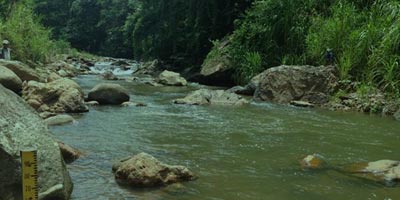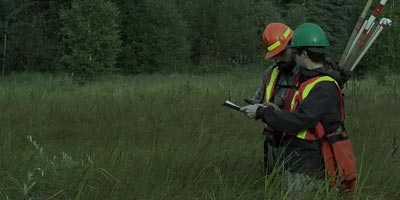
Adaptive Management
ESSA began in 1979, building on ideas developed at the University of British Columbia about how to creatively apply science and systems thinking to help people tackle complex environmental and social problems.
Ecosystems and social systems are complex, and always changing. We often don’t know how ecosystems and species will respond to human activities. As a result, environmental managers commonly face uncertainty about which actions will be most effective in meeting resource management objectives. Adaptive Management (AM) can provide a clear path forward.
AM is systematic, practical approach for improving resource management policies and practices. It provides a structured process for learning which management actions best meet management objectives, and for reducing resource management uncertainty. In its most effective form, an experimental approach is used to test clearly formulated hypotheses about important, but uncertain, components of a system. Effective AM requires considerable effort, planning and rigor. It is much more than simply monitoring and responding to observed outcomes (although these are important aspects of AM).
AM has been the cornerstone of ESSA’s approach since our inception in 1979, and informs the mindset we bring to all of our projects. We have developed AM plans across a wide range of situations and sectors including endangered species recovery, habitat and ecosystem restoration, fisheries and water management, and management of industrial emissions and mining effluent. AM can also be helpful in the following situations:
-
When there are difficulties deciding how best to achieve management or restoration objectives or deciding among alternative management actions
-
When stakeholders disagree about which are the most effective management actions for achieving stated objective
-
When there are uncertainties about the environmental outcomes of management practices, ecological restoration activities, facility operations, or mitigations
-
When regulators are faced with making decisions despite uncertainty about the environmental outcomes, and are unsure about what conditions to place on certificates, licenses or permits
Our work in this practice area encompasses:
- Expert advice on adaptive management across the AM cycle
- Independent review of AM plans
- Developing and implementing AM plans
- Quantitative decision analysis of alternative actions
- Screening uncertainties to identify the most critical questions
- Translating critical questions into testable hypotheses
- Detailed spatial monitoring design
- Design of data analysis and evaluation approaches
- Workshops with managers, scientists and stakeholders
- Technical and non-technical reporting and communication
- Tailored training sessions on AM best-practice
- AM policy guidance
Explore the following sample of projects in Adaptive Management which showcase our work and a foundational reading list from which we draw inspiration. Contact Carol Murray (cmurray@essa.com) or Marc Nelitz (mnelitz@essa.com) for more information about our work in this practice area.
- Allen, C.R., and A.S. Garmestani (editors). 2015. AM of Social-Ecological Systems. Springer Publishing. https://www.springer.com/gp/book/9789401796811
- Greig, L.A., D.R. Marmorek, C. Murray, and D.C.E. Robinson. 2013. Insight into enabling AM. Ecology and Society 18(3): 24. https://www.ecologyandsociety.org/vol18/iss3/art24/
- Marmorek, D., M. Nelitz, J. Eyzaguirre, C. Murray, and C. Alexander. 2019. Adaptive Management and Climate Change Adaptation: Two Mutually Beneficial Areas of Practice. Journal of the American Water Resources Association. Paper No. JAWRA‐18‐0047‐P. https://doi.org/10.1111/1752-
1688.12774 - National Research Council. 2004. Adaptive Management for Water Resources Project Planning. Washington, DC: The National Academies Press.https://doi.org/10.17226/10972
- Sit, V., and B. Taylor (editors). 1998. Statistical Methods for AM Studies. Ministry of Forests, Research Branch. 157 pp.https://www.for.gov.bc.ca/hfd/pubs/docs/lmh/lmh42.htm
- Stankey, G.H., R.N. Clark, and B.T. Bormann. 2005. AM of natural resources: theory, concepts, and management institutions. Gen. Tech. Rep. PNW-GTR-654. Portland, OR: U.S. Department of Agriculture, Forest Service, Pacific Northwest Research Station. 73 p. https://www.fs.fed.us/pnw/pubs/pnw_gtr654.pdf
- Walters, C.J. 1986. AM of Renewable Resources. New York, NY, MacMillan. http://pure.iiasa.ac.at/id/eprint/2752/1/XB-86-702.pdf
- Walters, C.J. and R. Green. 1997. Valuation of experimental management options for ecological systems. Journal of Wildlife Management. 64(4): 987-1006. http://www.jstor.org/stable/3802096
- Williams, B.K., and E.D. Brown. 2012. AM: The U.S. Department of the Interior Applications Guide. Adaptive Management Working Group, U.S. Department of the Interior, Washington, D.C. https://www2.usgs.gov/sdc/doc/DOI-Adaptive-Management-Applications-Guide-27.pdf
- Williams, B.K., R.C. Szaro, and C.D. Shapiro. 2009. AM: The U.S. Department of the Interior Technical Guide. AM Working Group, U.S. Department of the Interior, Washington, DC. https://www2.usgs.gov/sdc/doc/DOI-%20Adaptive%20ManagementTechGuide.pdf













